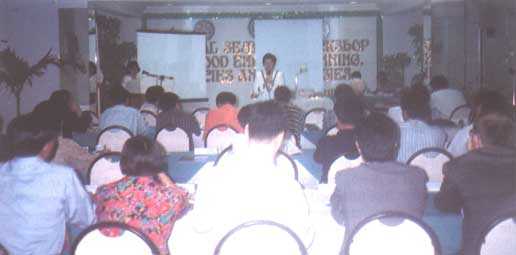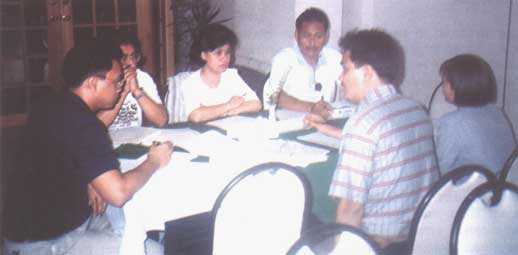2.1 Objectives
2.2 Participants
2.3 Workshop program
2.4 Opening ceremony
Recent studies done in the country confirm the significant role that wood energy plays in the energy, forestry, agriculture and rural economy sectors. These complex interrelationships suggest the need for a broad, open and enlightened discussion among key policy and decision makers to increase their awareness and understanding of wood energy concerns.
With this in mind this national seminar/workshop was organized with the aim of thoroughly discussing critical issues that affect the development and utilization of wood energy resources in the country.
It was hoped that in the process participants would develop the necessary capabilities not only to formulate responsive policy options but also to plan and implement wood energy development strategies that will improve the wood energy sector.
The seminar/workshop demonstrated the serious attention that the government gives to wood energy.
Key personnel from the government, private and non-governmental sectors at both national and local level were invited to participate in the workshop and contribute to its objectives.
These proceedings are the written account of the results and discussions that transpired during the seminar.
The objectives of the seminar/workshop were to:
a. update and deepen the knowledge of professionals in the relevant sectors on the current status, problems and potential of production and use of wood energy in the country;b. identify and assess impacts of plans, policies and strategies of relevant .sectors particularly, energy, forestry, and agriculture - which incorporate wood energy issues and concerns;
c. identify gaps and weaknesses in planning, policy formulation and analysis and program implementation that constrain the full potential of wood energy;
d. identify priorities for policy actions for strengthening the information base and planning capabilities and for enhancing organizational and institutional capacities for wood energy development.
The seminar/workshop was attended by: individuals and institutions involved in activities related to the production, processing, marketing and utilization of woodfuels; staff of relevant units of forestry, agriculture, energy departments and other relevant bodies involved in planning and policy formulation; and representatives of organizations/institutions involved in the implementation of wood energy programmes and projects both from the government and non-government sectors. The full list of seminar/workshop participants is shown in Appendix 1.
The seminar/workshop consisted of three sessions. The first session consisted of presentations on the wood energy situation in the Philippines. The intention of this session was to give the participants the current picture of wood energy supply and demand in the country. The second session presented the policies and strategies that are being implemented by the government in the non-conventional energy sector, including the wood energy sector.
For these two sessions, panelists who are experts in their own fields (such as energy, forestry, planning, project implementation, etc.) were invited to react and give their views on the presentations made. This was done to ensure a wider and deeper dissection of the topics presented from different perspectives.
The third session was in the form of a workshop and involved the open discussion of issues and problems besetting the wood energy sector. The output of the workshop was aimed at generating recommendations that would help the government to finalize its wood energy development and utilization programme. The participants were thus divided into two main groups: one to review national concerns while the other was devoted to local issues. The two main groups then were further divided to tackle three relevant topics. The program of activities for the seminar/workshop is in Appendix 2.
Dr. Francisco L. Viray, Secretary of the DOE delivered the opening remarks. It was stressed that wood energy remains a significant energy source in the country contributing as much as 30% of the Philippines' energy supply. Fuelwood plays a vital role in the energy, forestry, agriculture and rural economy sectors. Past studies also exhibited this resource's effect on the country's economic development. He emphasized that this seminar/workshop was a very good opportunity to underscore the serious attention that the DOE is giving to wood energy production and use in the country and to fully discuss all the issues and concerns which have a very profound impact on wood energy development and use. Through this, more responsive and appropriate policies and strategies which will enhance the planning and implementation of the country's wood energy programme can be adopted.
The speech of Mr. Romeo T. Acosta, Director, Special Concerns Office - DENR emphasized that fuelwood is renewable and its production can be sustained only when properly managed. Fuelwood scarcity can be addressed by having a comprehensive program of fuel conservation, tree planting, and adoption of new technologies. Lastly, he expressed his hope that given the very real nature of the problems facing the energy sector this assembly could help address the crisis that the country is facing.
Dr. William S. Hulscher, Chief Technical Adviser of the FAO-RWEDP cited the seminar's focus is on planning and policies. He stressed that wood energy is a major energy source in most countries thus it is timely to focus on policies, planning and strategies for wood energy. He also emphasized that some people do not pay attention to wood energy and its contribution to the national energy balance because they look at it as a traditional or even an old-fashioned source of energy. It was his view that wood energy may not yet have received its proper place because adequate data are lacking for planning purposes. He also clarified that fuelwood use is not the cause of deforestation as is often taken to be the case but rather it is the changing patterns of land use which are responsible.

